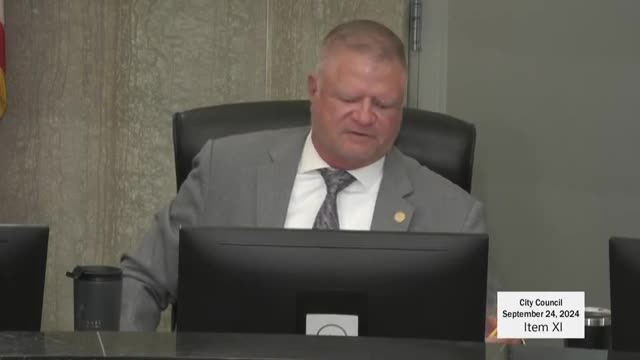Council approves major housing developments amid community concerns
September 24, 2024 | City Council Meetings, Oklahoma City, Oklahoma County, Oklahoma
This article was created by AI summarizing key points discussed. AI makes mistakes, so for full details and context, please refer to the video of the full meeting. Please report any errors so we can fix them. Report an error »

In a recent government meeting, significant discussions centered around various zoning applications and development proposals, reflecting ongoing efforts to balance growth with community concerns.
One of the key topics was a proposed Planned Unit Development (PUD) consisting of 79 lots on 167 acres, with an average lot size of over an acre and a half. The proposal received staff recommendations for approval, citing compliance with the comprehensive plan for rural medium designation. However, concerns were raised regarding the environmental impact of 79 septic systems in a densely populated area. A motion was made to defer the decision for four weeks to allow further consideration.
Another notable item was the rezoning of a site in Heritage Hills, which had previously faced heavy opposition. This time, the proposal for modified residential use received unanimous support from the Historic Preservation Commission and local residents, indicating a shift in community sentiment. The development aims to introduce townhome options in an area currently dominated by single-family homes.
Additionally, a developer presented a project aimed at affordable housing near downtown, emphasizing the need for more accessible living options in a rapidly gentrifying neighborhood. The developer expressed frustration with the lengthy approval process and highlighted the importance of a streamlined approach to foster affordable housing initiatives.
The meeting also addressed several other rezoning applications, including a project in Jefferson Park that aims to add duplexes to a historic neighborhood. The developer noted the importance of community engagement in gaining support for the project, which aligns with the neighborhood's character.
Overall, the discussions underscored the complexities of urban development, where the need for housing must be carefully weighed against environmental considerations and community preferences. The council's decisions in the coming weeks will be pivotal in shaping the future of these neighborhoods.
One of the key topics was a proposed Planned Unit Development (PUD) consisting of 79 lots on 167 acres, with an average lot size of over an acre and a half. The proposal received staff recommendations for approval, citing compliance with the comprehensive plan for rural medium designation. However, concerns were raised regarding the environmental impact of 79 septic systems in a densely populated area. A motion was made to defer the decision for four weeks to allow further consideration.
Another notable item was the rezoning of a site in Heritage Hills, which had previously faced heavy opposition. This time, the proposal for modified residential use received unanimous support from the Historic Preservation Commission and local residents, indicating a shift in community sentiment. The development aims to introduce townhome options in an area currently dominated by single-family homes.
Additionally, a developer presented a project aimed at affordable housing near downtown, emphasizing the need for more accessible living options in a rapidly gentrifying neighborhood. The developer expressed frustration with the lengthy approval process and highlighted the importance of a streamlined approach to foster affordable housing initiatives.
The meeting also addressed several other rezoning applications, including a project in Jefferson Park that aims to add duplexes to a historic neighborhood. The developer noted the importance of community engagement in gaining support for the project, which aligns with the neighborhood's character.
Overall, the discussions underscored the complexities of urban development, where the need for housing must be carefully weighed against environmental considerations and community preferences. The council's decisions in the coming weeks will be pivotal in shaping the future of these neighborhoods.
View full meeting
This article is based on a recent meeting—watch the full video and explore the complete transcript for deeper insights into the discussion.
View full meeting
